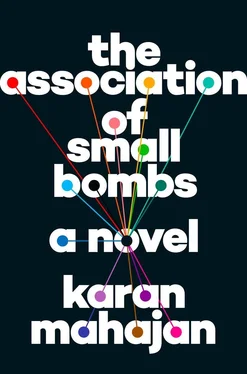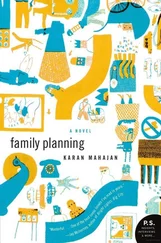He had never hated anyone with the passion that he brought to his hatred of Modi. He’d often wondered why, tried to examine how this bearded fellow had infiltrated his imagination, and could only chalk it up to one thing: Modi’s arrogance. There had been so many killers in Indian history but none as unrepentant or shameless as this capitalist politician pig. None had operated in public view. And none seemed so above the law, so beloved by Hindus of all kinds — yes, he hated the Chief Minister because he represented the worst in Hindus, a belief in their own invincibility that always sprang up when they were doing well, making money hand over first, a belief that you could get away with anything if only you had money. Forget Modi: he hated money too, money of all kinds, stripes, and currencies. He hated what the country had become, a capitalist stooge of America. In his mind he carried an image of India’s pure precapitalist past: a water pump by a paddy field unreeling a stream of electrified water. Where this image had come from he didn’t know — he’d never actually seen it; all he’d seen was the trash of Azamgarh and the crush of Delhi, where all the garbage was generated. Still, the image was powerful, and Tara and he had discussed ways in which it could be achieved, how India could shake off the shackles of Western capitalism. But the economy was a large, inexorable machine. There seemed to be no way to turn it back. “Not till lots of people are miserable and poor,” she’d said.
“But the rich will never be miserable,” he’d said. “And they rule the country.”
Zunaid came and told Ayub that he had someone he wanted him to meet. It was Shockie.
Shockie had been reluctant to meet Ayub; he had learned, from years of experience, that no one could be trusted when it came to the work of revolution.
So, when he met Ayub near Zunaid’s house, he asked Ayub basic questions about himself: his age, his birth place, his work background.
When he heard that Ayub had worked with inmates, people wrongly jailed for terrorist attacks, including the blast in 1996, he fell silent. “And you were doing this for free? Who was paying you?” Did Ayub know his friend Malik?
Ayub, meanwhile, was confused by Shockie. He must have been in his mid- or late thirties, but looked older: there were prominent worry lines on his forehead and something permanent-seeming about his small, black, tough mustache, as if it had been there from the beginning of time to assert his avuncular place in the world. His questions too, these worried, careful questions about money, were the questions of an uncle. Still, Ayub, who was used to being interviewed, said, “Sir, I worked for an NGO — they paid me. The condition in the jails is very bad, as you can imagine. There are no human rights.”
Shockie’s resolve, in the warm evening air, diminished. He’d waited so many years for news of Malik, for access to him — had even considered disguising himself and visiting him in jail — and now here was someone who had not only met Malik but also worked with him.
How would this fellow feel if he knew I was behind the blast? How would he respond? But this was the terrible thing about the profession — you could take credit for nothing. When blasts were mentioned, Shockie tried to clear his mind completely and respond with the mild shock of a civilian. He saw that he was on dangerous turf. “You will have to leave your family,” he said suddenly.
“Yes, sir.”
“No contact with your mother or father.” (He himself had never followed this rule, but that had been a different, less brutal time. The internationalization of terror, the increased scrutiny in the press, had changed everything.) “You can’t even know if they die. For you, they are dead from this moment.”
“Yes, sir,” Ayub said, surprised at how quickly the man’s tone had shifted, how he had gone from a harmless middle-aged uncle to a priest, delivering well-worn mantras and cleaning his nose occasionally by squeezing his nostrils with his fingers. He might have been stating the prayers for a marriage. There was something practical, nasal, and strict about it.
“You give up money, drinks, happiness. You give up everything. You’re ready for that?”
“Yes,” Ayub said.
Shockie paused, still testing him out. What was that expression on his face — that ready, watchful, but resigned expression?
“Why do you want to do this?” he asked him directly.
“To take revenge,” Ayub said.
“On who?” asked Shockie.
“On Modi,” said Ayub.
“For who?” said Shockie.
“For Muslims.”
“Why do you hate him so much?” Shockie asked. “He’s just a man.”
“He’s not a man; he’s a symbol.”
“There’s something else,” Shockie said. “A man like you doesn’t turn to revolution just like that. What do you want? Are you angry? You want to show the world you’re a hero?”
Ayub considered this. The reasons were murky in his head, all the more so because he had lived them out with such intensity. Death. I want to die. Some weeks ago, he had taken a drug in the field. The drug was mixed with milk and peddled by the local witch doctor. What had followed was a series of terrifying hallucinations. First the fields, bulging under the sodium lamp of the sun, had changed colors, parted, leapt about, danced with flames of murmuring wheat. He could touch and see everything for kilometers around. Then, as he’d walked, he’d had a strong sense that all the people around him — the men in their small square stalls, selling bidis and phone chargers; the auto drivers; the farmers whipping their skeletal bulls; the man selling pomegranates by the circuit house; the boy riding his bicycle to and from the shabby hotel; the frightened women in burqas clustered outside their homes, awaiting their husbands from the Gulf — were monkeys . Yes, monkeys, animals . That’s what people were when you took away the basic veneer of civilization. And he’d had a vision then of Tara, a vision of love. What was Tara but a lost monkey from a powerful family of monkeys, who’d fallen down from her tree and randomly played with a poor monkey far from its own family? No, there was nothing to do but feel sad about Tara — what fault was it of hers? She had been pulled back into the thicket of her family and that was how it should be. As for him, he was a small, wounded, seeking animal, one who had strayed from the path a long time ago; he saw now that his time in Delhi, with Tara, had been a conference of the weak. They thought they were changing the world, but everyone except for him could see they were weak, damaged animals, clasping each other.
Why am I so wounded? he thought. But that is the fate of certain people. They lose themselves and never find themselves again.
He saw too, in this vision on drugs, that the world was dictated by power (he did not think, as he would later, that the reason he’d had such nihilistic visions was that he was depressed). What was Modi but a violent, screaming animal demanding the death and destruction of other clans? There were two ways to handle such a fat chest-beating monkey: to hide away forever in the forest or to attack him and his clan. In an instant, hallucinating, the field leaping about, he grasped the swift logic of violence. The world existed in a state of battle between clans and races. Each clan rose at the expense of the other. Whenever one came up, it was important to cut it down to size with violence…. He thought of 9/11, a crime that had, for all its religious implications, always seemed opaque to him, and it was clear that, in world historical terms, if you thought of the world as a jungle, what had happened was simple, obvious: sensing the rising power of one group, Atta and company had attacked the temple of that group.
Читать дальше












